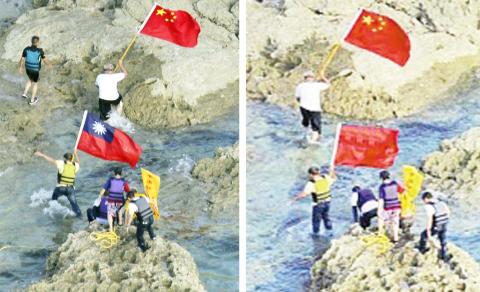|
Ma has hurt ties with Tokyo, TSU
caucus whip says
By Chen Ching-min and Stacy Hsu / Staff reporter, with staff
writer

Pro-China activists carry flags
on one of the disputed Diaoyutai Islands on Wednesday, left, and how a similar
picture appeared in the Xiamen Business Newspaper, right.
Photos: AFP and CNA
President Ma Ying-jeou (馬英九) has hurt
bilateral relations and economic ties with Japan because of his handling of the
latest spat over the disputed Diaoyutai Islands (釣魚台) and he should be held
accountable for a “severe dereliction of duty,” Taiwan Solidarity Union caucus
whip Hsu Chung-hsin (許忠信) said yesterday.
The president is guilty of a serious dereliction of duty as the head of state
for his failure to issue a solemn declaration to the international community
that none of the 14 pro-China activists arrested by Japan on Wednesday were
Republic of China (ROC) nationals and for conveying a false impression that
Taiwan is teaming up with China, Macau and Hong Kong in asserting its
sovereignty over the disputed islands, Hsu said.
“This not only brought a negative impact on Taiwan-Japan ties and economic
cooperation, but also prompted a nonsensical diplomatic tussle between the two
countries,” he said.
Hsu was referring to 14 pro-China activists from Hong Kong, Macau and China who
set sail on a China-flagged boat from Hong Kong on Sunday and landed on one of
the disputed islands on Wednesday to defend China’s sovereignty of the
resource-rich area.
While Taiwanese activists did not join their cross-strait colleagues because
they were not able to rent a fishing boat, the government did dispatch Coast
Guard Administration vessels to provide food supplies and an escort for the boat
for what the government said were “humanitarian reasons.”
Seven of the pro-China activists later jumped off the boat onto one of the
islands and placed the national flags of the ROC and the People’s Republic of
China on the island.
“While no ROC nationals or Taiwanese fishing boats participated in the landing
and none of the activists flying our national flag had ROC nationality, the
international media may have a different interpretation of the situation [of ROC
and PRC flags flying side-by-side on the disputed islands,]” Hsu said.
Hsu added that since none of the detainees were ROC nationals, the Ma
administration’s calls for their immediate release were baseless.
“On what basis did the government demand for those activists be released when it
is not even in any position to make such a call?” Hsu asked.
“Besides, Chinese media does not even recognize the existence of the ROC,” Hsu
said, refering to the China-based Xiamen Business Newspaper altering the ROC
flag in a front-page photograph showing the activists setting foot on the island
with flags in their hands.
Democratic Progressive Party (DPP) lawmakers agreed with the criticism of Ma’s
administration.
DPP Legislator Huang Wei-cher (黃偉哲) said the illusion of collaboration between
both sides of the Taiwan Strait and the two Chinese special administrative
regions against Japan over the sovereignty disputes was detrimental to the
country.
“Although it requires further investigation as to the role played by the Chinese
authorities in the activists’ [unilateral] action to plant an ROC flag on the
islands, the move did carry a political undertone that [the two sides both
belong to] ‘one China,’” Huang said.
Huang said Taiwan’s National Security Bureau and the Ministry of Foreign Affairs
should respond and firmly reiterate Taiwan’s status as an independent nation.
Lashing out at the Ma administration’s “soft stance” over long-running
territorial disputes, DPP Legislator Yeh Yi-jin (葉宜津) said the government’s
handling of the matter did not conform to international standard pratices
adopted by other nations in similar situations.
The Ma administration has given the international community the impression that
it is playing a two-handed strategy — proposing an East China Sea peace
initiative, while teaming up with China to resist Japan, Yeh said.
“How can two countries involved in the same sovereignty dispute join hands to
defend their ownership against another claimant?” Yeh asked, adding that the Ma
administration is a pushover in the face of Chinese pressure.
|
![]()
![]()
![]()